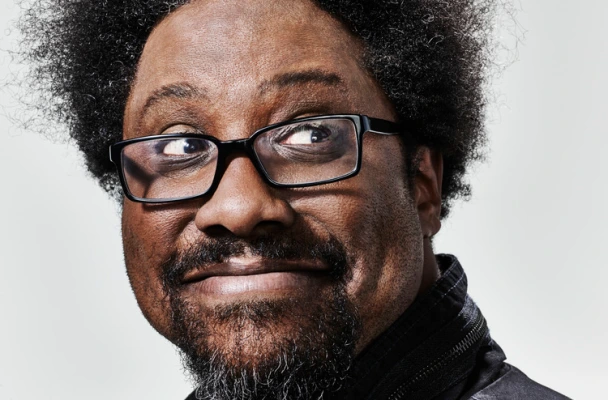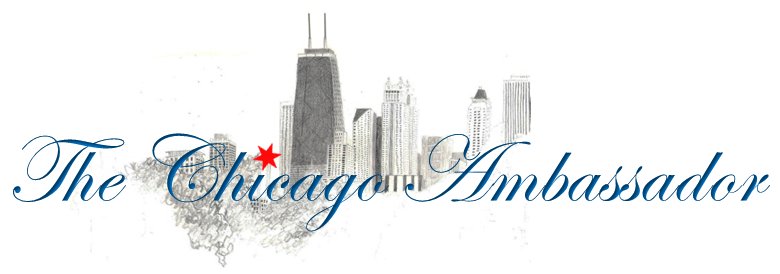W. Kamau Bell makes people laugh and think, whatever their shade

W. Kamou Bell. Photo by John Nowak/CNN
W. Kamau Bell talks about race and politics a lot. And with a bit of salt creeping into his unkept hair, along with the goatee, one may think that he’s a trying to be a next generation Cornel West. But he has no doctorate. And he hasn’t written any books. What he has is comedy, and although there have been many socio-political comedians, Bell has found a niche. He currently hosts the CNN documentary series, United Shades of America, which premiered last month with Bell meeting with leaders of the Klu Klux Klan and attending a cross burning in the pilot episode, not typical comedy material.
It’s hard to pinpoint exactly why Bell is finally making the big time. Perhaps it’s because he moved around a lot as child, leaving him to be an outsider who observed a lot. Perhaps it’s because when becoming frustrated with doing stand-up comedy, instead of giving up he did the opposite and took a big gamble — renting out a theater in San Francisco where eventually his show was seen by Chris Rock. Not long after, Rock convinced the head of the FX Network to give him a show — Totally Biased with W. Kamau Bell, which ran in 2012 and 2013 and was executive produced by Rock. Probably, it’s a combination of everything along with the key fact that he is just plain funny.
Along with hosting United Shades of America, Bell is a busy man. His stand-up special W. Kamau Bell: Semi-Prominent Negro is currently playing on Showtime. He currently co-hosts the podcast Denzel Washington Is The Greatest Actor Of All Time, Period with comedian Kevin Avery; hosts Kamau Right Now! on KALW radio in San Francisco. Additionally, he continues to perform and tweak his one-man show that he’s been performing for the last decade, The W. Kamau Bell Curve: Ending Racism in About an Hour.
Bell, 43, spoke to The Chicago Ambassador from Berkeley, California, where he lives with his wife and two young daughters. He will be in Chicago to perform at the Merle Reskin Garage Theatre May 20 with colleague Hari Kondabolu, raising money for charity Housing Forward, which helps homeless people make the transition to permanent housing.
Interviewed by Bob Chiarito for The Chicago Ambassador.
CA) Friday will be a return to Chicago for you, having partly grown up here. What are your thoughts on that?
BELL) Yeah, I went to high school in Hyde Park, at the University of Chicago Laboratory School. Then I went to college in Philadelphia at the University of Pennsylvania until I dropped out and came back to Chicago to attend the conservatory program at Second City. I have the red T-shirt and think I still owe them $180. I started doing stand-up in Chicago and attended Columbia College.
CA) I read that you really bounced around a lot as a child and that you didn’t really fit-in with any specific group and were sort of an outsider. How much has that shaped you as a person and also your comedy?
BELL) Yeah. I think there’s two types of comedians. There are people who were the class clown and there are people who sit in the back of the room and don’t ever say anything and have all these thoughts in their head that they only share with close friends. I was definitely the latter. No one that I went to high school with would describe me as the class clown. They would probably say ‘I didn’t even know what his voice sounded like.’ My good friend Jason Smith, who I’ve been friends with since high school, he was not surprised when I said that I wanted to be a comedian. He is now on the board of Housing Forward, the organization I’m doing the event for next week.
CA) You dropped out of the University of Pennsylvania to pursue your career in comedy. Did you have a major before leaving?
BELL) [Laughs] I thought I did, but looking back, no. Actually, it was East Asian Studies because at the time I didn’t have a lot of extracurricular activities so after school I began taking Kung Fu classes. I thought maybe I’d become the next Bruce Lee and learn Chinese. But that didn’t take.
CA) What did you get out of Columbia College and Second City?
BELL) Second City gave me the courage to do stand-up comedy. It also taught me that I was not going to be rivaling the best of Second City, but I had a good time there. I paid to be at Second City, I was never paid to be at Second City. And Columbia College was a great place. They had all the equipment there and all the knowledge there, it was up to you to figure it out. I took some film classes and theatre classes and was doing stand-up at the same time.
CA) Obviously race and other social issues are the main themes of your comedy. That’s something that seems very important to you. If you had to pick one thing – to make people laugh or to enlighten them, what would you chose?
BELL) I’m a comedian first. I just happen to be a comedian who cares about these topics. I’m a dad too so if I had to pick one thing I would just be a dad, but that doesn’t pay enough. A lot of people think that I’m some Poly-Sci Ph.D. who is like, ‘How do I get people to care about the movement?’ I use humor. I grew up watching Saturday Night Live and Eddie Murphy, the artist formerly known as Bill Cosby and Seinfeld. So if would peace reigns tomorrow, I think I’d still be a comedian. I’d just have to find another topic.
CA) Chris Rock is largely credited as the person who “discovered” you, but that would have never happened if you didn’t press on in the face of adversity. I read that you once considered leaving comedy because you were tired of performing for San Francisco audiences that didn’t want to hear about race or politics. But then in a punk-rock move, you rented out a theater and wrote your own show — The W. Kamau Bell Curve: Ending Racism in About an Hour. Can you talk about that experience?
BELL) Yeah. Second City was a punk rock move for stand-ups in Chicago. Improv Olympic was a punk rock move from Second City. Chicago and San Francisco are very D-I-Y, where you just do it yourself.
CA) You toured that show for years, largely on college campuses and continued to update it with whatever was going on in the news. Do you still perform it?
BELL) Yes, I just did it at Vassar last Friday. Everyone asks if I’m going to put it on DVD and I tell them, ‘No, this is my retirement plan.’ I do update it a lot and nine years after starting it, it has changed a lot.
CA) You seem to be pretty accessible to your fans and give back – your show here in Chicago is a fundraiser for Housing Forward, an organization that helps people transition out of homelessness that your best friend Jason Smith is a member of its board of directors. How cool is that for you?
BELL) When we were in high school he was this wake-and-bake Grateful Dead fan and I was a Kung-Fu class taking quiet guy who never had a date. And now he’s a pillar of the Oak Park business district and on the board of this organization and I’m a a social/political comedian and we can do something together. We are living the dream. Who would have guessed this?
CA) As a bonus, you’ll be with Hari Kondabolu, who is a stand-up and also was a writer on your FX Show, Totally Biased with W. Kamou Bell. What does Hari bring?
BELL) He’s my comedy best friend, while Jason is my best-friend, best-friend. Jason is a big fan of Hari also. Hari is a political comedian like me because I’m the West Coast black guy and he’s the East Coast Asian guy, we bring a lot of different things to the table.
CA) I can’t let you go without talking about your CNN show “United Shades of America.” Everyone is still talking about that first episode, where you met with leaders of the Klu Klux Klan and attended a cross burning. Whose idea was that?
BELL) That was 100 percent mine. When we pitched the show and were kicking around ideas, I was always interested in the KKK. I wanted to see them in a protected environment, I wouldn’t drive there and go there myself. When we talked about ideas, I kept coming back to that. There are a lot of shows about the KKK and a lot of them are doing a version of the same thing. I said, ‘This is the pilot, we have to do something that no other show is doing.’ I felt like if I could do a show about the Klan and make it comedic in some way, but also make it revealing, that’s the show that I want to make several episodes of.
CA) You’ve set the bar pretty high. What is in store for viewers for the rest of the season?
BELL) You know, the second episode was about prison and while a lot of people said the first episode was fun and crazy, many said the second episode was better. People have to realize that it’s about the journey and as long as I’m there, whether it’s something I know about or not, the journey is what is interesting to me, not the destination. I was just in Camden, New Jersey talking about policing in America and hanging around the cops, and as a black man in this country, that’s as dangerous as the Klan. [Laughter] They were great and they were happy to participate. I never felt any danger with the Klan, I didn’t think they were going to kill me on camera. But I knew if I didn’t handle it well, I wouldn’t be helping people who look like me and people who are afraid of people like me
CA) Where do you see yourself in 5 years?
BELL) I hope the show gets to season two, three, four and five. I think there is a lot more that can be done. I think after the first season we’ll get more access. The first season some are confused. It’s CNN, it’s a comedian….’What?” I also have other projects. I have a podcast about Denzel Washington and a talk radio show in San Francisco. I rather have a lot of things going on than one project that takes up all my time.
CA) Any plans to get into movies like one of your idols, Eddie Murphy?
BELL) No, I don’t have plans like that. I think I’ll continue as a comedian like Jon Stewart and like George Carlin. I’m basically just trying to play me, a better version of me. Certainly if Michael Bay calls tomorrow and says he could imagine me in Transformers 19, I’d take that truck of money. I’m not closing the door, but I’m not pounding it open either. It’s hard enough to figure out how to be me.
United Shades of America airs Sundays at 9 p.m. CST on CNN.
For tickets to W. Kamau Bell’s May 20 Chicago show, click here.
Be sure to “Like” us on Facebook!




Leave a comment